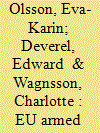| Srl | Item |
| 1 |
ID:
144726


|
|
|
|
|
| Summary/Abstract |
This article explores how armed forces in EU member states work with and view social media in national and international settings, and what the patterns of convergence/divergence are on these issues. To that end, a questionnaire targeted at EU armed forces was constructed. An index of qualitative variation was calculated to explore the relative convergence among respondents (n = 25) on issues of risks and opportunities with using social media nationally and internationally. Consistent with previous research on European armed forces, we found higher levels of divergence than convergence. Contrary to our expectations that similar challenges, joint international standards, and membership in international organizations would foster convergence with regard to social media use in areas of deployment, we found that convergence appeared foremost pertaining to the domestic level. Policy divergence was strongest in areas of deployment.
|
|
|
|
|
|
|
|
|
|
|
|
|
|
|
|
| 2 |
ID:
167593


|
|
|
|
|
| Summary/Abstract |
Despite the growing debate over the European Commission’s (hereafter, Commission) role in crises, there are few systematic explanations for the variety of actions undertaken by the Commission in times of crisis. This article outlines a heuristic device to explain the Commission’s actions during crises, based on the variables ‘Commission mandate’ and ‘member state engagement’. To this end, it examines two crisis events that affected two strategically important policy areas for European Union integration: the early stages of the financial crisis that began in 2008 and the migration following the 2011 Arab Spring. Based on analysis of these cases, this study identifies four strategies applied by the Commission: doer, follower, cooperator and recycler. Our study concludes that member state engagement and Commission mandate are important variables in explaining under which circumstances these strategies are used by the Commission.
|
|
|
|
|
|
|
|
|
|
|
|
|
|
|
|